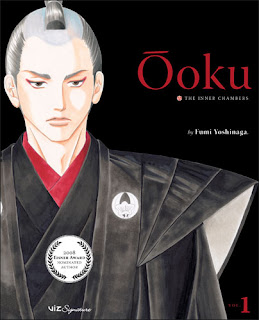Manga Monday: Ooku
Ooku: The Inner Chambers (Volume 1)
Fumi Yoshinaga
.
 The latest title in Viz's excellent Signature Line of manga is the 2009 winner of the Osamu Tezuka Cultural Prize and is brought to us by the creator of acclaimed series such as Antique Bakery.
The latest title in Viz's excellent Signature Line of manga is the 2009 winner of the Osamu Tezuka Cultural Prize and is brought to us by the creator of acclaimed series such as Antique Bakery.
.
Ooku: The Inner Chamber has a pretty intriguing premise. During Japan's Edo Period, a disease sweeps the nation that kills 8 out of every 10 men, leaving the remaining men a rare commodity that must be cared for, or Japan will die out altogether. Women take up the roles that men previously held in the fields, taking up arms, and turning the role of government on its head and becoming a matriarchy. Not only are men limited to who they can marry, and many males from lower class families are "rented out" to seed women who are unable to buy male prostitutes, but the ruling shogun keeps an "inner chamber" in her palace, with hundreds of beautiful men at her disposal, locking away their beauty and seed until they shrivel up, wasted for her exclusive whim. This is a very rich premise that is seen through the eyes of Mizuno Yunoshin, a boy so beautiful that he's the envy of everyone from the inner chambers, but is kind enough to earn their love and respect. It's through him that we see the nature of the inner chamber, how a lack of female bodies forces them to interact with one another sexually, and hold a complex hierarchy of roles from laborers to masters, all vying for the chance to be the shogun's concubine. And amid the fascinating goings-on is Yoshinaga's beautiful artwork of soft pretty men, detailed architecture and wonderful intricate fashions upon the robes and dress of her characters during this time period. The pacing is also top-notch, with some pretty intense, suspenseful scenes masterfully played out through Yoshinaga's panels, much of the story's emotional arcs carried along via facial expressions and quiet looks. The structure of the book is a little odd however, as up to the last chapter, the book's focus is upon the man Mizuno Yunoshin. But as his arc comes to a close, the focus shifts to that of the shogun and how she cunningly maneuvers things in her favor, but rules a fair, tight kingdom. This is a really interesting book and I'm not quite sure how it's going to proceed, especially with the shogun's radical ideas and the shifts in perspectives exemplified thus far, but Yoshinaga is a master storyteller and I trust this intriguing story to her capable hands.
Fumi Yoshinaga
.
 The latest title in Viz's excellent Signature Line of manga is the 2009 winner of the Osamu Tezuka Cultural Prize and is brought to us by the creator of acclaimed series such as Antique Bakery.
The latest title in Viz's excellent Signature Line of manga is the 2009 winner of the Osamu Tezuka Cultural Prize and is brought to us by the creator of acclaimed series such as Antique Bakery..
Ooku: The Inner Chamber has a pretty intriguing premise. During Japan's Edo Period, a disease sweeps the nation that kills 8 out of every 10 men, leaving the remaining men a rare commodity that must be cared for, or Japan will die out altogether. Women take up the roles that men previously held in the fields, taking up arms, and turning the role of government on its head and becoming a matriarchy. Not only are men limited to who they can marry, and many males from lower class families are "rented out" to seed women who are unable to buy male prostitutes, but the ruling shogun keeps an "inner chamber" in her palace, with hundreds of beautiful men at her disposal, locking away their beauty and seed until they shrivel up, wasted for her exclusive whim. This is a very rich premise that is seen through the eyes of Mizuno Yunoshin, a boy so beautiful that he's the envy of everyone from the inner chambers, but is kind enough to earn their love and respect. It's through him that we see the nature of the inner chamber, how a lack of female bodies forces them to interact with one another sexually, and hold a complex hierarchy of roles from laborers to masters, all vying for the chance to be the shogun's concubine. And amid the fascinating goings-on is Yoshinaga's beautiful artwork of soft pretty men, detailed architecture and wonderful intricate fashions upon the robes and dress of her characters during this time period. The pacing is also top-notch, with some pretty intense, suspenseful scenes masterfully played out through Yoshinaga's panels, much of the story's emotional arcs carried along via facial expressions and quiet looks. The structure of the book is a little odd however, as up to the last chapter, the book's focus is upon the man Mizuno Yunoshin. But as his arc comes to a close, the focus shifts to that of the shogun and how she cunningly maneuvers things in her favor, but rules a fair, tight kingdom. This is a really interesting book and I'm not quite sure how it's going to proceed, especially with the shogun's radical ideas and the shifts in perspectives exemplified thus far, but Yoshinaga is a master storyteller and I trust this intriguing story to her capable hands.


Comments